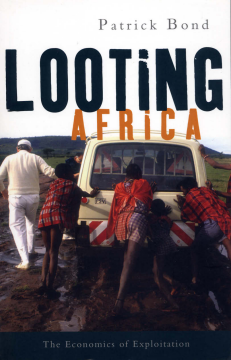
Additional Information
Book Details
Abstract
Despite the rhetoric, the people of Sub-Saharan Africa are become poorer. From Tony Blair's Africa Commission and the Make Poverty History campaign to the Hong Kong WTO meeting, Africa's gains have been mainly limited to public relations. The central problems remain exploitative debt and financial relationships with the North, phantom aid, unfair trade, distorted investment and the continent's brain/skills drain. Moreover, capitalism in most African countries has witnessed the emergence of excessively powerful ruling elites with incomes derived from financial-parasitical accumulation. Without overstressing the 'mistakes' of such elites, this book contextualises Africa's wealth outflow within a stagnant but volatile world economy.
'Patrick Bond's book provides a solid theoretical, empirical, and analytical framework showing and proving that the processes of looting the African continent, which started with the slave trade, have continued to this day'.
Professor Issa Shivji, University of Dar es Salaam, Tanzania
'A brilliant analysis and timely expose of the rapacious forces ranged against Africans today.'
John Pilger
‘An important contribution to the political analysis of the continent, as viewed on the inside.'
ComAfrica, Brazil
'This is a sophisticated book for a non-specialist audience, filled with rage at the self-serving drivel that passes for analysis of Africa in the mainstream and the deaths it is responsible for.'
Ken Olende, Socialist Review
Patrick Bond, a political economist, is research professor at the University of KwaZulu-Natal School of Development Studies in Durban where he directs the Centre for Civil Society (http://www.ukzn.ac.za/ccs). He is also visiting professor at York University Department of Political Science in Toronto and Gyeongsang National University Institute of Social Sciences in South Korea. He previously taught at the University of the Witwatersrand Graduate School of Public and Development Management, Yokohama National University Department of Economics and the Johns Hopkins University School of Public Health.
Table of Contents
| Section Title | Page | Action | Price |
|---|---|---|---|
| Contents | v | ||
| Figures and Tables | vi | ||
| Preface and Acknowledgements | vii | ||
| Notes | xvi | ||
| 1. Poor Africa: Two views | 1 | ||
| Racism, inequality, patriarchy, anthropomorphism \r | 5 | ||
| The structure of this book\r | 8 | ||
| Notes | 9 | ||
| 2. Uneven and Combined Development: Neoliberalism, stagnation and financial volatility | 11 | ||
| Global stagnation, volatility and crisis displacement\r | 14 | ||
| New rounds of global financial volatility? | 21 | ||
| Draining the South | 24 | ||
| Notes | 27 | ||
| 3. Financial Inflows and Outflows: Phantom aid, debt peonage, capital flight | 31 | ||
| Aid ebbs, flows and phantoms | 32 | ||
| Debt repayment squeeze | 38 | ||
| Debt relief smoke and mirrors | 40 | ||
| Nigeria scammed | 46 | ||
| Financial portfolio (dis)investment and capital flight | 49 | ||
| Financial liberalization's false promises | 51 | ||
| Notes | 52 | ||
| 4. Unequal Exchange Revisited: Trade, investment, wealth depletion | 55 | ||
| Trade traps | 56 | ||
| Commodity export dependency and falling terms of trade\r | 58 | ||
| Rural inequality and perverse subsidies\r | 64 | ||
| Investment, production and exploitation | 71 | ||
| FDI and natural resource depletion | 74 | ||
| Accounting for nature | 77 | ||
| Foreign investment in privatization | 82 | ||
| Foreign investment, tax fraud and transfer pricing\r | 84 | ||
| Production, transport and the ecological debt\r | 85 | ||
| Labout migration as resource depletion\r | 89 | ||
| Notes | 91 | ||
| 5. Global Apartheid’s African Agents: Home-grown neoliberalism, repression, failed reform | 95 | ||
| African neoliberalism derailed? | 98 | ||
| Elite opportunities lost | 100 | ||
| Global governance gimmicks at the Bretton Woods institutions | 105 | ||
| UN Security Council obstinacy | 107 | ||
| Notes | 108 | ||
| 6. Militarism and Looming Subimperialism in Africa: Washington, London, Pretoria | 111 | ||
| Washington's reach | 114 | ||
| South Africa's subimperial functions | 119 | ||
| Pretoria's world leadership? | 123 | ||
| Staking claims through NEPAD | 125 | ||
| Johannesburg business interests | 128 | ||
| Notes | 131 | ||
| 7. Civil Society Resistance: Two views | 136 | ||
| A major distraction gimmick | 138 | ||
| Reparations from - and closure of - global financial institutions | 141 | ||
| Programmes to end the looting | 149 | ||
| From space to network to state? | 152 | ||
| Conclusion: from looting to liberation | 158 | ||
| Notes | 161 | ||
| Index | 165 |
